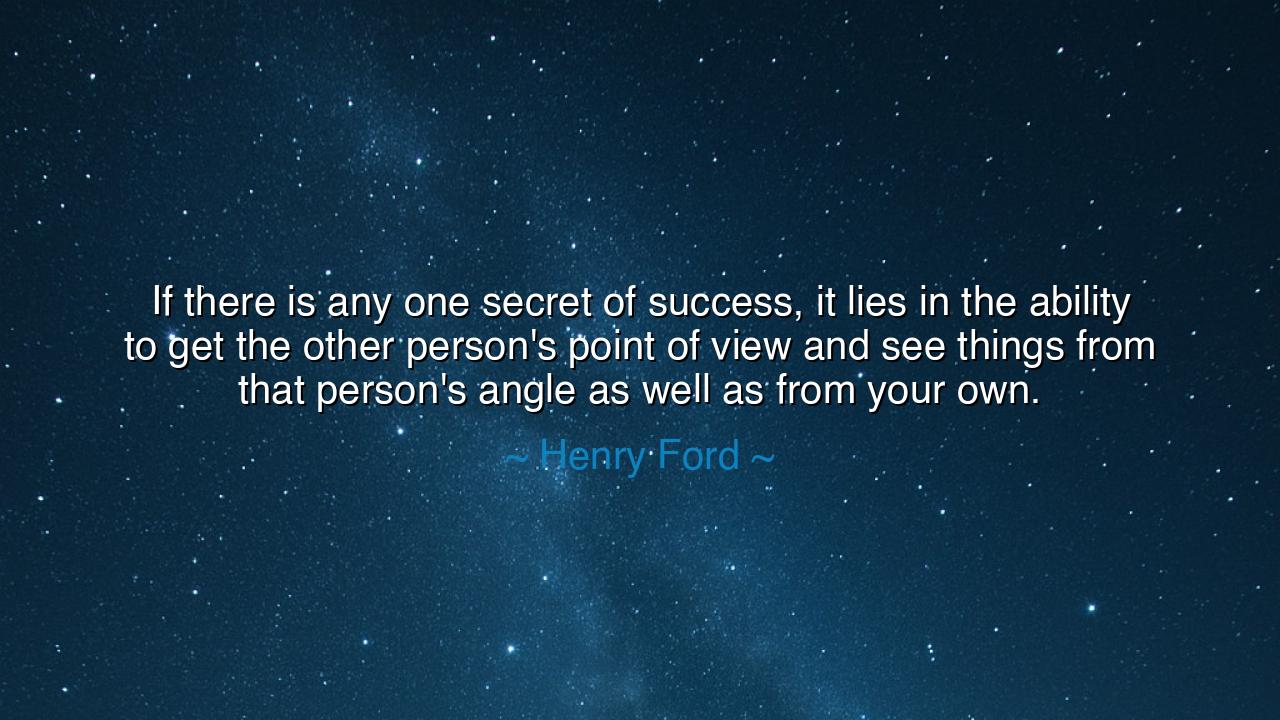
If there is any one secret of success, it lies in the ability to
If there is any one secret of success, it lies in the ability to get the other person's point of view and see things from that person's angle as well as from your own.






“If there is any one secret of success, it lies in the ability to get the other person’s point of view and see things from that person’s angle as well as from your own.” Thus spoke Henry Ford, the man who reshaped the world’s roads and redefined industry. In this saying lies not only the wisdom of a builder of machines, but the insight of a builder of human understanding. For success is not the fruit of isolation, nor the product of one mind alone—it is born of the capacity to enter the thoughts, the struggles, the hopes of others, and to weave them into one’s own vision.
The origin of this truth lies in the nature of human community. A man may be clever, a woman may be brilliant, but without the ability to see through the eyes of others, their wisdom remains narrow, their efforts incomplete. Ford himself demonstrated this when he built not simply a car, but an affordable car. He understood that the common worker, not the wealthy elite, needed mobility, and thus he designed the Model T to meet their reality. He stepped into their angle of view, and in doing so, he forged a revolution.
History has seen this lesson proven again and again. Consider Abraham Lincoln, who during the American Civil War bore the burden of a fractured nation. He did not govern only from his own mind; he strove to understand the hearts of North and South, the anguish of the enslaved, the fears of the soldiers, the longings of the mothers. By striving to see through the eyes of friend and foe alike, he guided the country not with tyranny, but with empathy. His success as a leader was rooted in his ability to view the conflict through more than one lens.
Or look further back, to Alexander the Great. Though a conqueror, he did not simply impose his Greek vision upon all he subdued. Instead, he learned from the cultures of Egypt, Persia, and India, adopting elements of their traditions, marrying across lines, and blending their practices into his empire. This ability to see from another’s angle created a fusion of civilizations that endured long after his armies had passed. Though his empire crumbled, the cultural synthesis he sparked survived, carried on through centuries.
Ford’s saying also speaks as a warning against arrogance. Many fail not because they lack intelligence or talent, but because they are blind to the views of others. The merchant who ignores the needs of the customer, the ruler who disregards the cries of the people, the artist who refuses to consider the heart of the audience—all may rise for a moment, but their success cannot endure. To see only your own angle is to walk with one eye closed; to see from both is to walk with balance and foresight.
The lesson for us is clear: if you would succeed in life, in work, in love, you must cultivate the art of empathy. Strive daily to ask: what does the other see? What does the other fear? What does the other hope for? In doing so, you expand your vision beyond the narrow boundaries of self and enter into the wider wisdom of humanity. This is not weakness, but strength, for the one who understands others can lead, can serve, can build bridges where others only see walls.
Therefore, let each person act with humility and openness. Listen before you speak, consider before you judge, and seek to understand before you demand to be understood. Practice this not only in grand matters, but in the smallest of daily encounters—with family, with colleagues, with strangers. In each moment of true understanding, you cultivate the seed of success, for you align yourself not only with your own vision, but with the shared vision of those around you.
So let Henry Ford’s words endure: “The ability to get the other person’s point of view… that is the secret of success.” Take them as both command and compass. For riches and fame may vanish, but the gift of understanding others creates legacies that endure. To see through another’s eyes is to honor their humanity, and in doing so, to enlarge your own.






AAdministratorAdministrator
Welcome, honored guests. Please leave a comment, we will respond soon